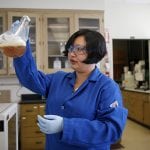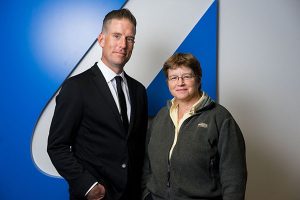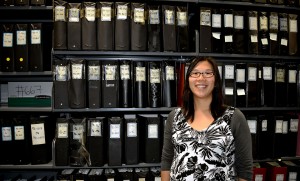- Dr. Ningkun Wang, who received the 2017-18 Emeritus and Retired Faculty Association Research grants, is photographed in her lab at San Jose State University on Tuesday, Oct. 23, 2018, in San Jose, Calif. ( Josie Lepe/San Jose State University )
- Ruma Chopra, who received the 2017-18 Emeritus and Retired Faculty Association Research grants, is photographed at San Jose State University on Tuesday, Oct. 23, 2018, in San Jose, Calif. ( Josie Lepe/San Jose State University )
By David Goll
For the fifth consecutive fall semester, San Jose State University’s faculty will have the opportunity to apply for an internal grant from the Emeritus and Retired Faculty Association (ERFA). Applications for the 2018-19 research grants awarded by ERFA are due Dec. 5. The application and more information are available online. The organization—comprised of former SJSU faculty members, some of whom are still teaching on a part-time basis—provides grants of $2,500 to selected faculty members to further their research, scholarship and creative activities agenda.
Last year’s recipients say ERFA’s Faculty Research, Scholarship and Creative Activity Awards have been a boon to their research. Though the program has typically made two such grants annually, a larger budget last year allowed for three awards. They were given to Ruma Chopra, professor of History; Ningkun Wang, assistant professor of Chemistry; and Alan Soldofsky, professor of English and Comparative Literature and director of Creative Writing.
Chopra used her award to travel to various libraries across the United Kingdom to conduct research on how climate-based migrations shaped empires — in this case, the eighteenth-century British Empire’s expansion into the Americas, West Africa, South Asia and the South Pacific.
“I researched how the environment, topography, and proximity to water shaped decision-making at local and imperial levels,” she said, citing their powerful influence in the 1700s, before the conveniences of electricity changed our sense of being surrounded by nature. The research is helping fuel her plans to write a book on the subject, for which she is already writing a proposal. She conducted her research last winter at The National Archives and The British Library, among other institutions.
“The work most historians do involves many trips to archives,” Chopra said. “Getting small pots of money to continue that work is vital. I was so grateful this money came my way during a key time in the development of this book project.”
Chopra said she found members of the ERFA committee that reviews grant applications to be knowledgeable and enthusiastic.
“It’s wonderful how supportive ERFA is when it comes to encouraging research,” she said. “We are incredibly fortunate.”
Wang was in her first semester as an SJSU faculty member a year ago when she learned of the ERFA grant program through the university’s Office of Research.
“Thought I would give it a try,” she said. “I’d never heard of a program where retired faculty did something like this. It’s very encouraging for new faculty when people who have been there before understand the value of supporting research.”
Her project is potentially groundbreaking for the healthcare industry. She’s studying how specific enzymes and proteins affect aging and diseases associated with that process, including diabetes and Alzheimer’s. She is working with seven undergraduates and three graduate students on her work.
“We want to contribute to our collective academic knowledge on this subject, not make the next miracle drug,” she said, noting that some pharmaceutical companies are working on creating new drugs to treat ailments of aging.
Using the ERFA grant as seed money, Professor Wang is now applying for additional grants from the National Science Foundation and the National Institutes of Health. The ERFA grant also paved the way for three of her student researchers to present results of their work at the annual conference of the American Society for Biochemistry and Molecular Biology next year in Orlando, Fla.
Soldofsky used his grant to conduct interviews with American poets who were either born outside the United States, or are the children or grandchildren of immigrant families who retained their indigenous language and/or culture.
“As a Latina that loves and sometimes writes poems, I am looking forward to his future anthology of poems,” said Elba Maldonado-Colon, 2018-19 ERFA president and retired SJSU Professor of Education who still teaches part-time. “Of the 25 applicants, the SJSU ERFA Committee had the challenging task of selecting three faculty members for the available awards. Not easy.”
Maldonado-Colon added that in addition to tenured and tenure-track faculty lecturers with at least six years of continuous service to SJSU are also eligible for the grants.




